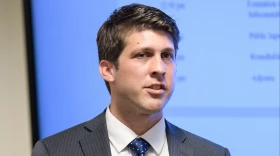On stage in the Foulds Theatre at the Alliance for the Arts through January 29 is Theatre Conspiracy’s production of Selina Fillinger’s play Faceless. A two-time winner of the Agnes Nixon Playwriting Festival and the recipient of the first annual Judith Barlow Prize, Fillinger based this high-concept courtroom drama on the case of a 19-year-old Colorado woman, Shannon Maureen Conley, who was arrested in 2014 at Denver International Airport as she attempted to board a flight bound for Istanbul to meet and marry an ISIS fighter known simply as Y.M.
In Faceless, Conley’s alter ego goes by the name of Susie Glenn. Her faceless romanticized ISIS fighter calls himself Reza. Among the play’s many strengths is the light it shines on how normal, innocent people like Shannon and Suzie can be radicalized online.
Newcomer Vanessa Schoof plays Glenn, and sheds light on the preconditions that cyber predators look for in potential targets.
“I kind of connected it with how cults bring in people,” Vanessa shares. “They’re lost. They’re broken. Their ends meet and when somebody comes in who is warm and welcoming, they manipulate them. And that’s how they get them in. Anybody can be manipulated. Basically, in a way, she was being brought into the cult of ISIS.”
Miguel Cintron, who makes his Theatre Conspiracy directorial debut with this memorable show, agrees.
“So, yes, it’s the perfect formula for someone to be manipulated into some situation. They’ve suffered a loss. They’re looking for something. They’re lonely. They’re looking for community, so yeah, she’s the perfect type of person to be manipulated by someone like this.”
Played by Sharon Isern, Suzie’s nemesis is Claire Fathi, a recent Harvard grad and aspiring federal prosecutor who is assigned to the case not because of her credentials or legal acumen, but because she is Muslim. An emerging force in the Southwest Florida theater scene, Isern zeroes in on the unique dangers posed by social media when it comes to radicalizing vulnerable and impressionable targets.
“In the old days, maybe you saw a flier somewhere or you saw something on TV or you read the newspaper. Now you can just go online … People find you. You respond to something. People can catfish you and make you think they’re someone who they’re not, and this can happen to anybody at any point at any time ….”
The role played by the Twitter, Facebook and other social media platforms is placed in stark relief through internet exchanges, comments and icon and emoji images projected on a large screen that hangs above Suzie Glenn’s head like the proverbial Sword of Damocles. The audience doesn’t just see how Reza plays and preys upon Suzie’s vulnerabilities. It witnesses how a host of faceless cyberspace denizens demean and attack Suzie for falling victim to this master manipulator.
“They don’t think about the girl. They don’t think about this being a young 18-year-old girl who made a mistake,” Director Miguel Cintron explains. “They just want their perceived justice. And very few people on social media come to the girl’s defense. There’s just so many people that, I mean, you see the horrible things that are said on the social media posts. I don’t even want to repeat them. But you can just see tweet on top of tweet on top of tweet that’s so negative, so hurtful, and that, in itself, is another part of the story. And it’s so powerful to watch.”
In fact, this vitriol coupled with a slew of handwritten death threats ultimately lead – spoiler alert – Suzie to attempt suicide.
Every actor is challenged to find a way to communicate with their character – to understand their thoughts, emotions and motivations. Sometimes that takes an actor to places they’d rather not go, but they courageously venture anyway, and that’s true for Vanessa Schoof who, like her character, lost her mother at a young age and contemplated suicide at a particularly low point in her life.
“I have certainly thought about it a while ago, but every time I thought about it I would sob and I never went through with it. But with her, she goes through with it because she believes that this is the way … to pay for what she’s done because she’s realizing now that her world is broken down she realizes like, what can I do? You know, everybody hates me, you know, everybody around me has betrayed me, even the man that I thought was there for me, was my anchor, I don’t even know who he is any more. I don’t know who anyone is.”
Yet another theme in this concept-heavy play is that of cultural appropriation. Specifically, Suzie Glenn converts to Islam via Twitter and then has the temerity to quote the Koran to Claire Fathi, triggering such outrage that Claire agrees to prosecute the case even though she initially declined to be manipulated in that way by her boss, who is considering a run for political office.
As a woman and minority, Sharon Isern doesn’t just understand, she’s had to fend off that kind of manipulation her entire life. And she also possesses a fundamental understanding the strident reaction to Suzie’s cultural appropriation that informs her portrayal of her own character.
“If you’re a certain way or born into a particular culture, this is who you are. You’ve been living this your entire life. Of course you’re angry when someone just step in, waltz in and try to look like Muslim Barbi when in reality they don’t know anything. They don’t know that when you try to walk home as a Muslim woman and you’re wearing a hijab, people look at you differently. You might feel threatened. People may call out to you, they may actually harass you and touch you in ways that you don’t want to be approached. And it’s the reality of how you live …. Where somebody who’s been appropriating it may not really feel that. They may accept certain things if it’s easy but when it gets a little hard, they can step away from it and then it doesn’t affect them anymore.”
In the end, what makes this show so intense and compelling is brilliant direction, emotional and enlightened acting and the imaginative use of lighting to amp up the tension that crackles with each new line and turn of events. And nowhere is that more on display than the reaction that Suzie’s father has to the events playing out in the trial, including the indictment of his own failure in helping his daughter grieve the loss of her mother, laying the predicate for her ultimate radicalization. In this role, Todd Miller delivers some of the most heart-rending scenes of the night.
For all of these reasons and more, this is a five-star production you don’t want to miss.
To read more stories about the arts in Southwest Florida visit Tom Hall's website: SWFL Art in the News.













